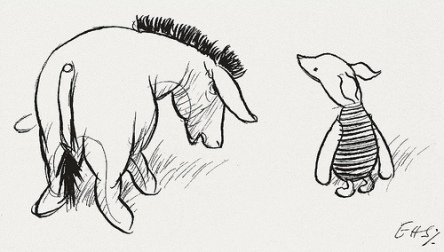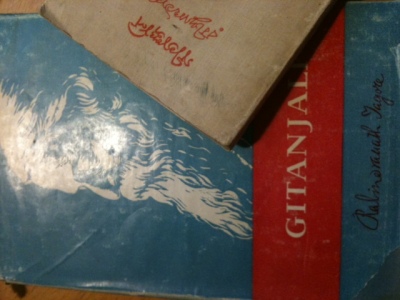All I can say is – I tried. After my Bengali translation I’ve put the English again. Corrections are badly needed!

পূহ দিকে দিকে দেখেছে – প্রথমে ডান দিকে এবং পরে বাঁ দিকে।
“উপহার?”পূহ বলে।”জন্মদিনের কেক?” পূহ বলে।
“কোথায়?”
“তুমি দেখতে পারছেনা?”
“না,”পূহ বলে।
“আমিও না,” ঈঅর বলে,”ঠাট্টা করেছিলাম. হি হি.”
পূহ মাথা চুল্কিয়েছে, একটু ধাঁধা লাগিয়েছে।”কিন্তু সত্যিই এটা তোমার জন্মদিন?”
“সেই,” ঈঅর বলে।
“ওহ! ভালো হয়ে থাক,ঈঅর.”
“আর ভালো হয়ে থাক, তুমিত্ত,ছোট ভালুক.”
“তবে এটা আমার জন্মদিন নয়!”
“হ্যাঁ তুমি সঠিক এটা আমার জন্মদিন.”
“কিন্তু তুমি বলেছো ‘ভালো হয়ে থাক -‘
“কেন হবেনা তো ? আমার জন্মদিনের সময়, তুমি কি নিত্য অসুখী আছো কেন?
“আছা, আমি বুঝি,’ পূহ বলে।
“এটা অনেক খারাপ,” ঈওর বলে, প্রায় ক্রঁদ করাছে, “যা আমি খুবই অখুশি,কারণ আমার উপহার নেই, আমার কেক নেই, মোমবাতি নেই, সবাই আমাকে অমনোযোগী হয়, কিন্তু যদি সবাই অখুশি হবে -“
সব অসহ্য পূহের জন্য।
“ওখানে থাকো,”পূহ ঈওরকে ডাকাছিল একই সময়ে ঘোরেছে আর বাড়িতে তারাতারি চলে গেয়েছিল;কারণ ওর কিছু উপহার ইওরের জন্য পাওয়া উচিত আর পরে একটি টিক টিক উপহার এওরকে দেবে।
Pooh looked–first to the right and then to the left. “Presents?” said Pooh. “Birthday cake?” said Pooh. “Where?”
“Can’t you see them?”
“No,” said Pooh.
“Neither can I,” said Eeyore. “Joke,” he explained. “Ha ha!”
Pooh scratched his head, being a little puzzled by all this. “But is it really your birthday?” he asked.
“It is.”
“Oh! Well, many happy returns of the day, Eeyore.”
“And many happy returns to you, Pooh Bear.”
“But it isn’t my birthday.”
“No, it’s mine.”
“But you said ‘Many happy returns’–”
“Well, why not? You don’t always want to be miserable on my birthday, do you?”
“Oh, I see,” said Pooh.
“It’s bad enough,” said Eeyore. almost breaking down “being miserable myself, what with no presents and no cake and no candles, and no proper notice taken of me at all, but if everybody else is going to be miserable too—-”
This was too much for Pooh. “Stay there!” he called to Eeyore, as he turned and hurried back home as quick as he could; for he felt that he must get poor Eeyore a present of some sort at once, and he could always think of a proper one afterwards.











![IMG_1673[1]](https://mybangladiary.wordpress.com/wp-content/uploads/2013/04/img_16731.jpg?w=150&h=112)
![IMG_1672[1]](https://mybangladiary.wordpress.com/wp-content/uploads/2013/04/img_16721.jpg?w=112&h=150)


